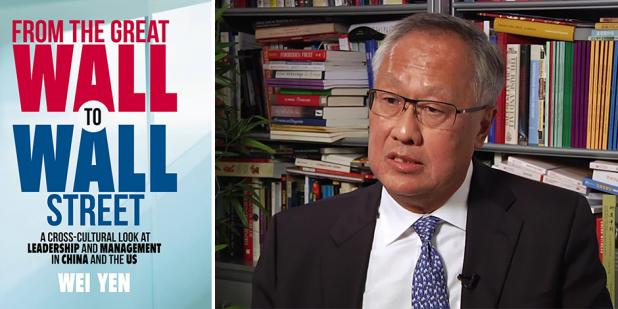AASHNA MALPANI WRITES — Mr. Wei Yen, the author of From the Great Wall to Wall Street and an adjunct professor of Graduate Finance at Pepperdine University, has spent years studying the U.S and China’s economy and cultures.
As these two countries solidify their status as global superpowers, the world is left guessing the outcome of their often volatile relationship in economic and political terms, but rarely in cultural terms. With his experience of both the US and Chinese cultures, and working on both sides of the Pacific, Mr. Yen weighs in on the future of Sino-American relationship in an exclusive Asia Media interview.
What is the first step in understanding the China and U.S relationship?
First, we should look at both cultures. It is my belief that Chinese and Westerners are different people because of the way they are brought up. The Chinese came from the farmer stock, by nature they are diligent and long-term thinkers, while Westerners got their culture courtesy of the early Greeks, who were sailors and traders. They are analytical problem solvers, but also adversarial by nature.
Westerners often think any issue can ultimately be separated into two outcomes, black or white or two adversarial components. Logic is the tool that allows this to happen. Although logic was formulated by Aristotle a couple of thousands years ago, it remains central to how the Western world thinks and makes decisions. The result is that we tend to focus on differences of any issue and make judgments from that while denigrating their commonalities.
But the Chinese don’t always think that way. They don’t think that things must be separated precisely into discrete and opposite “black” and “white” components. In fact, traditional Chinese believe that all things are related. There is “me” in “you” and “you” in “me” and it’s difficult to separate the two of us cleanly. Lao Tzu, the founder of Taoism says so clearly in Tao De Ching in the Yin and Yang context that everything has both Yin in the back and Yang in the front. Yin and Yang can not be separated, because within the Yin there is a small piece of Yang and vice versa. In terms of how this works in practice, it means if I seek to destroy you, I will also destroy myself, which is a lose-lose proposition. The Chinese worldview is very different than the Western adversarial worldview.
Keeping these “fundamental differences” in mind, what then prompts this ‘war?’
Most people in the West don’t understand the Chinese too well. They may think that the Chinese are just a more backward version of themselves. I beg to differ. Today we have the world’s two largest economies, US and China. A third one India is coming up rapidly. Americans will have to deal with these two countries more and more. However, if they don’t know much about their cultures and that could be problematic in the future.
China is one of the oldest cultures in the world, but it also has one of the fastest growing economies. How did this happen? Is it market economics or something else? I find it fascinating how the country was able to jettison hardline class struggle (binary black or white ideology) to go back to a more traditional harmonious Chinese approach to problem-solving. Old things don’t necessarily mean they are obsolete. It could mean that they are timeless and valuable.
There is also a lot of cultural misunderstanding. Trump administration is doing just that. It attempts to put maximum economic pressure on the Chinese, hoping that they will capitulate to our demands. But I don’t think that’s going to work out the way Trump wants to. I think the Chinese are going to drag this trade war out, enduring near-term pains, but over time the pain will emerge to hurt the Americans as well, at which point there could be an attempt at settlement, but it would not end the way Trump has wanted. Since our economies are so tightly intertwined, there is only one outcome from a trade war, and that is a lose-lose for both sides. Here, Trump and his supporters should try to understand the Chinese culture a bit better. It will help them better predict outcomes from any policy initiatives related to China.
As someone who has spent most of his life between U.S and China, how did you adapt to and accommodate these vast cultural differences?
The key is to find things that are important in your culture and the other culture and at the same time make sure they don’t cause conflicts in you. Because if there are conflicts, then you can get confused and you may have to pick one side or the other. But I think with some practice you can actually harmonize the two cultures, and there shouldn’t be any conflict. After you have done that, you will feel in tune with yourself and your environment, wherever it may be.

